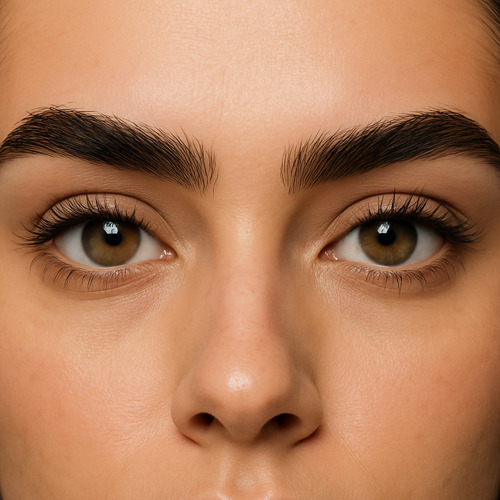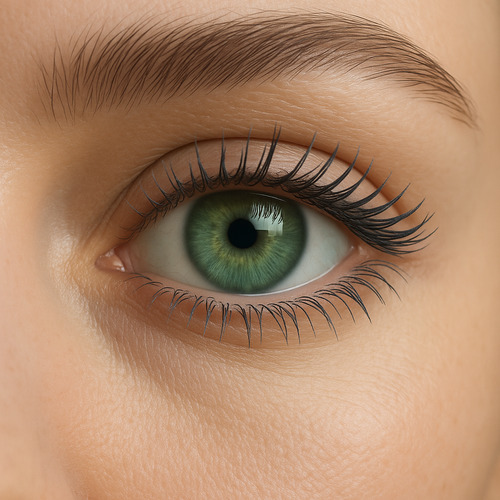Eyebrows are one of the most expressive features of the face: they frame the eyes, give structure, and make the facial features look more harmonious. Some people are naturally blessed with thick, full brows that are easy to maintain, while others need to find more creative ways to style and shape them. In any case, eyebrows play a key role in creating a variety of cosmetic looks. But what should you do if you notice that their shape starts changing on its own?
Even with regular care, eyebrows can become thinner. Often, it is enough to be more gentle: minimize the use of harsh hair products, wash your brows carefully, and avoid excessive sun exposure.
In some cases, this is sufficient to restore thickness, but sometimes eyebrow thinning is linked to more serious causes that require attention. Which factors, according to dermatologists, most often lead to eyebrow hair loss and how you can prevent it — we will explore in this article.
1. Overplucking
When you spend too long staring in the mirror—especially a magnifying one—it’s easy to start nitpicking every single brow hair. Just one careless pluck can throw off their natural balance, and before you know it, you’re overcorrecting the arches until there’s hardly anything left.
This happens to everyone, but fortunately, one aggressive tweezing session won’t ruin your brows forever. The key thing to remember: plucking too often can lead to long-term thinning. Repeated trauma may eventually disrupt the hair follicle root, and as a result, the stem cells responsible for new hair growth may stop regenerating.
If your brows have suffered from over-maintenance, the first step toward recovery is simple: put down the tweezers. Allow your brows to grow out naturally and resist the urge to hunt down every stray hair, especially if you know you won’t be able to stop.
If certain spots remain sparse or hair growth seems slowed, don’t lose hope. You can try castor oil—it’s known as a natural hair growth stimulator that helps strengthen hair and promote regrowth.
Tip: Pregnant women should avoid products containing castor oil, as it may stimulate labor. As with any cosmetic product during pregnancy, it’s best to consult your doctor before use.
2. Underlying or chronic skin conditions
If you have eczema or psoriasis, this probably won’t surprise you — these chronic skin conditions can contribute to hair loss both on the scalp and on the eyebrows. If you’re dealing with such conditions, you’ve likely already experienced itchy rashes. But even if you don’t suspect you have these issues, and the skin under or around your eyebrows feels itchy, inflamed, or flaky, it’s worth consulting a dermatologist. Any scratching or rubbing will only make hair loss worse.
3. Autoimmune diseases
Autoimmune diseases such as hypo- and hyperthyroidism, lupus, or androgenetic alopecia can lead to thinning eyebrows. Although these conditions more commonly appear in middle age, they may have genetic or hormonal origins, and their progression can vary from person to person.
4. Aging
Aging affects all of us differently, but hair thinning is quite a common occurrence. Over time, hair follicles stop actively renewing and supporting hair growth, which causes the strands to become thinner and more fragile. Hormones also play an important role here: thinning of the hair usually begins around the age of 40, when testosterone or estrogen levels drop.
Although we cannot stop time, there are ways to restore the visual fullness of the brows. Dermatologists recommend darkening the hairs with tinting or trying microblading—a semi-permanent makeup technique that mimics individual hairs with fine drawn strokes.
5. Nutrient Deficiencies
When the body lacks essential vitamins, it begins to “borrow” them from less vital functions. Hair growth is one of these functions. For example, a deficiency of vitamin D, which is common among many adults, can lead to eyebrow thinning. At the same time, vitamin D is necessary not only for healthy hair but also for strengthening bones, supporting the immune system, and reducing the risk of cardiovascular disease and certain types of cancer. The body prioritizes disease prevention over maintaining thick eyebrows, so vitamin D is “taken away” from the hair follicles to support other systems.
In addition to vitamin D, deficiencies in zinc, selenium, and iron can also affect hair health. Make sure to include these nutrients in your diet or consider supplements. This may mean spending more time in the sun, eating red meat and legumes, or taking a daily specialized supplement. Results won’t appear instantly, but over time hair thinning will slow down, and its condition will improve.
6. Stress
It can be unpleasant to realize how much stress affects our mind and body. One of the unexpected consequences of overwork or neglecting mental health can be hair loss.
When we experience stress or emotional strain, the body produces the stress hormone cortisol. It is useful, providing the necessary surge of adrenaline, for example, to escape danger. However, at the same time, secondary functions such as hair growth may switch into a "rest mode."
Although it is impossible—and unnecessary—to completely eliminate cortisol, learning to manage it is entirely achievable. If eyebrow thinning is related to stress, psychological therapy may be helpful.
7. Trauma
If you have experienced physical or emotional trauma, this can also lead to thinning eyebrows. This condition is called telogen effluvium—sudden hair loss. According to dermatologists, this process is reversible and can be managed with over-the-counter treatments and effective stress management. If the hair does not regrow within three to six months, it may be necessary to discuss hormone therapy with your doctor.
FAQ
Can thinning eyebrows grow back?
Yes! Depending on the cause of eyebrow thinning, you can use prescription creams, medications, or over-the-counter products that may help restore your brows and stimulate fuller growth.
Should I see a doctor about thinning eyebrows?
It depends on the situation. If, after reading, you’re almost sure that thinning is due to over-plucking or waxing, the first step is to give your brows some rest. At the same time, it’s important to watch for warning signs. Seek medical advice immediately if you notice sudden thinning of your eyebrows or if it affects only one brow.
What deficiencies can cause eyebrow thinning?
Thinning eyebrows may indicate a deficiency of vitamin D, zinc, or selenium in the body.


